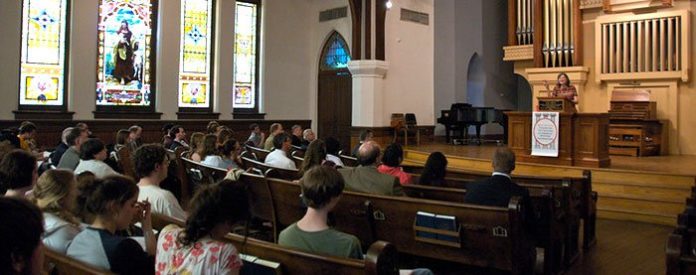By Katherine Manson
Mercer University's classrooms are filled with student and faculty exchanges, but it is often conversations outside the classroom that can have the deepest impact. Mercer's Center for America's Founding Principles builds opportunities for such conversations, gathering students and faculty in group discussions and conferences focused on the country's founding. The groups read and study the texts that helped shape the founders' philosophies, and, in turn, the nation they created.
“The Center creates a community of people on campus who are always thinking about these big important questions about who we are and why America is the way it is,” said Dr. Will R. Jordan, co-director of the center and associate professor and chair of the Political Science Department. “It's rare in higher education that such a community exists, specifically with a focus on the American founding. Every college and university has classes on these things, but there's not necessarily a community of people meeting to discuss from all different disciplines.”
Co-director Dr. Charlotte Thomas, professor and director of the Philosophy, Politics and Economics Program, agrees that the faculty and student reading groups are a driving force of the Center.
“When we take the time to listen to each other, form our own opinions and try to help other people understand where we're coming from,” Dr. Thomas said, “we're not only learning about the ideas of democracy with that conversation, but we're actually practicing democratic virtue.”
Since the Center's founding in 2008, faculty and invited students have been meeting six times a semester to read and discuss books important to America's founding to gain a deeper understanding and engage in the kinds of conversations had by America's founders. In addition to these faculty and student discussions, the Center has featured guest lecturers throughout the year that coincide with the books and ideas being discussed in the reading groups.
“The Center helps students appreciate how much learning goes on outside of the classroom,” Dr. Jordan said. “The people who are involved in the Center love the Great Books program. What we wanted to do was have something that supplemented that and added depth to the conversation by bringing in speakers, but having a focus on the founding of America.”
In the fall, the Center received a $1 million gift from Mercer alumnus and former trustee A.V. Elliott. The gift ensures the future of the Center and will endow the annual A.V. Elliott Conference on Great Books and Ideas. The Center culminates the year with the conference on a specific topic related to America's founding, featuring invited faculty members from institutions nationwide.
This year's conference, titled “The Moral and Political Philosophy of Adam Smith,” takes place April 3-4. The event will feature eight scholars and experts on Smith, the 18th Century philosopher best known for his works The Theory of Moral Sentiments and An Inquiry into the Nature and Causes of the Wealth of Nations. The conference will include several lectures by prominent founding scholars and close with a keynote address by Dr. Douglas Den Uyl from Liberty Fund. The conference will also feature a student panel where students will have the opportunity to present in front of experts from across the country, as well as two faculty panels discussing Smith.
The endowment will also fund one of the Center's reading groups leading up to the conference. In addition, they may use a portion of the endowment to publish a volume of the material presented and discussed at the conference, Dr. Jordan said.
The debate and conversations have encouraged and brought scholars across the nation to become involved with the Center. The Center has been influential to the faculty and students involved in the yearlong discussions and debates as it encourages them to form new ideas, Dr. Jordan said.
Junior Ronnie Davis has enjoyed participating in the discussions at the Center because of its interdisciplinary approach. Participants are exposed to new perspectives they may not have gathered from the reading. He is a philosophy and political science major and is participating in the reading groups discussing Wealth of Nations and Theory of Moral Sentiments, as well as previous discussions of the Federalist Papers, in addition to attending several lectures.
“The Center has presented our campus with an avenue for understanding the history that has led us to where we are today and where we should be going in the future,” Davis said. “And I think that's one of the best things a group can do here on a campus full of people who aspire to play a large role in American culture, politics, business and service.”
Reading and discussing the same books the founders of the nation did gives the students a window into that world, while discussing those insights with others in a civil way. The experience helps them model the civil discourse that is often lacking in modern debates, Dr. Thomas said. Through this process, the Center is helping the students to become better citizens.
“One of the most important things that a College of Liberal Arts can do is produce informed, thoughtful, considerate people who can talk to each other about important things with civility,” Dr. Thomas said. “The Center not only makes us more informed about the American founding and about the education that our founders' had, it makes us more informed, practiced citizens better able to have civil discourse.”










